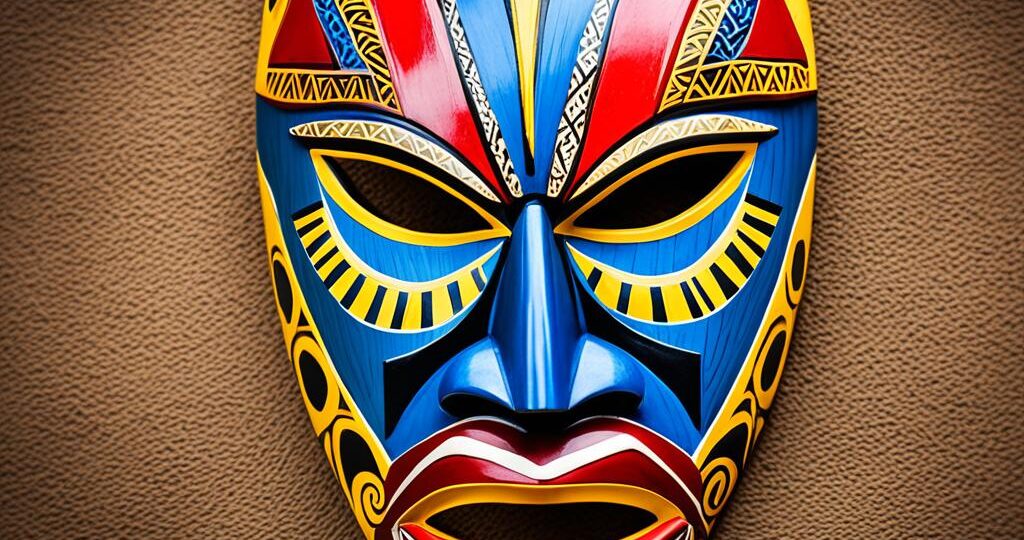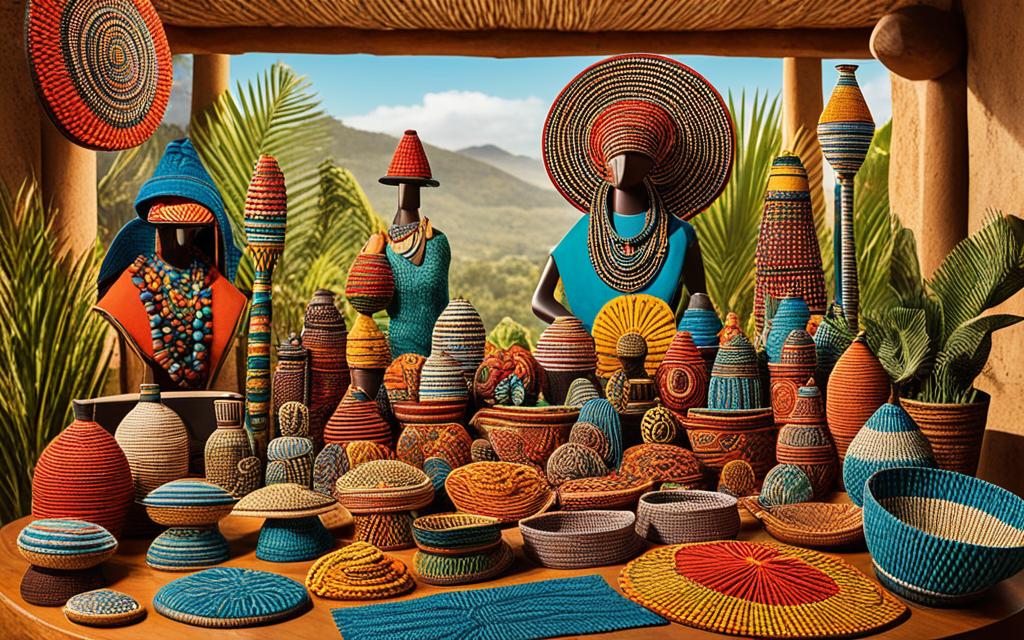Explore African Arts and Crafts – Handmade Heritage
March 5, 2024 | by mediaforafrica.net

Have you ever wondered about the stories woven into the vibrant fabrics of African arts and crafts? The intricate patterns, the skillful techniques, and the cultural significance behind each handmade masterpiece? Prepare to embark on a journey that will mesmerize your senses and ignite your curiosity as we explore Africa’s rich tradition of traditional handicrafts and celebrate the talented artisans who bring them to life.
Key Takeaways:
- African arts and crafts are a manifestation of the continent’s cultural heritage.
- Traditional handicrafts showcase the skill and creativity of African artisans.
- Exploring African art and craft traditions offers insights into indigenous craftsmanship.
- African tribal art carries deep cultural and symbolic meanings.
- Supporting local artisans contributes to the preservation of African cultural heritage.
Exploring African Art and Craft Traditions
In this section, we invite you to embark on a fascinating journey through the diverse and enchanting world of African art and craft traditions. From the intricate beadwork of the Maasai people to the bold and expressive wooden masks of the Dan tribe, Africa’s artistic heritage is a treasure trove of creativity and cultural significance.
Indigenous craftsmanship lies at the heart of African art, with each piece crafted by skilled artisans who have inherited centuries-old techniques passed down through generations. These artisans pour their passion, expertise, and cultural knowledge into their creations, resulting in art that not only captivates the eye but also tells stories of African history, spirituality, and identity.
A Closer Look at African Tribal Art
One of the most captivating forms of African art is tribal art, which reflects the spiritual beliefs, social structures, and rituals of various African communities. Behind each mask, sculpture, or painting lies a deeper meaning that connects to the tribe’s cultural heritage and worldview.
“Tribal art captures the essence of Africa’s diverse cultures, beliefs, and stories. It embodies the spirit of community, ancestral wisdom, and the natural world.” – African Art Scholar
African tribal art encompasses a range of styles and mediums, from the elegant elongated figures of the Bambara people of Mali to the intricate pottery of the Zulu tribe in South Africa. Symbolism plays a significant role in these artworks, with each motif representing a specific historical event, social status, or spiritual concept.
The Beauty of Indigenous Craftsmanship
Indigenous craftsmanship is a testament to the ingenuity and creativity inherent in African art. The skills required to create these masterpieces are often acquired through apprenticeships, where young artisans learn from seasoned craftsmen, ensuring the preservation of these ancient traditions.
Materials such as wood, clay, metal, fabric, and beads are transformed into stunning works of art, reflecting the natural resources abundant in various regions across Africa. Each piece is meticulously crafted, with attention to detail and a deep respect for the cultural significance the artwork holds.
Preserving Africa’s Artistic Legacy
By exploring African art and craft traditions, we gain a greater appreciation for the beauty, diversity, and cultural significance of these creations. We recognize the importance of supporting and celebrating African artisans, not only for the preservation of their craft but also for the positive impact it has on their communities.
“Purchasing African handmade goods is not just acquiring a unique piece of art; it is an investment in the preservation of Africa’s cultural heritage and the empowerment of its artisans.” – African Arts Advocate
Through our support, we contribute to the continuation of these rich traditions and the economic sustainability of local communities. Moreover, we honor the legacy of Africa’s artistic heritage, ensuring that future generations can appreciate and learn from the profound beauty embedded in African art and craft traditions.
Celebrating Local Artisans and Handmade Goods
At the heart of African arts and crafts are the talented local artisans who pour their creativity and skill into every handmade piece. They are the custodians of Africa’s rich artistic heritage, and their dedication is worthy of celebration.
These artisans bring to life a wide range of African handmade goods, each embodying the cultural diversity and artistic expressions of their respective communities. From intricate textiles to intricately carved figurines, their creations are a testament to their exceptional craftsmanship.
“African arts and crafts are not merely objects; they are vessels that carry the stories, traditions, and values of our people. Each piece is a work of art, a labor of love, and a testament to the beauty of our African heritage.” – Aya Ndiaye, Master Artisan
By supporting these local artisans, we contribute not only to the preservation and promotion of African cultural heritage but also to the sustainable development of their communities. Through the purchase of African handmade goods, we help create economic opportunities, empower local craftsmen, and foster a sense of pride and identity within their societies.
Moreover, buying African handmade goods allows us to connect directly with the creators behind the products. Every piece tells a story, and these artisans, steeped in their craft traditions, are often more than willing to share the narratives and symbolism imbued in their work.
When we choose African handmade goods, we become ambassadors of cultural appreciation and diversity. We bring a piece of Africa’s artistic legacy into our homes, symbolizing unity and respect for different cultures.
Supporting Local Artisans: Impact on Communities
The impact of supporting local artisans goes beyond nurturing artistic traditions. It creates a ripple effect that positively influences communities in various ways:
- Preservation of cultural heritage: By engaging in the trade of African handmade goods, artisans can continue passing down their knowledge and skills to future generations, ensuring the preservation of cultural heritage.
- Economic empowerment: Local artisans gain economic independence and stability through the sale of their products, allowing them to support their families and invest in their communities.
- Social cohesion: The success of artisans promotes a sense of pride and unity within their communities, strengthening social bonds and fostering a collective appreciation for cultural diversity.
By celebrating and supporting local artisans, we honor their artistry, contribute to their livelihoods, and become part of a greater movement towards cultural preservation and sustainable development.

| Benefits of Supporting Local Artisans | Impact |
|---|---|
| Economic empowerment | Stability and growth for artisans and their communities |
| Preservation of cultural heritage | Safeguarding traditional craft techniques and knowledge |
| Social cohesion | Fostering pride and unity within communities |
Conclusion
Our exploration of African arts and crafts has uncovered a treasure trove of African cultural heritage. Through the mastery of traditional handicrafts and the skilled work of artisans, we have witnessed the beauty and significance embedded in African cultural expressions.
From the intricately beaded jewelry of the Maasai people to the vibrant Kente cloth of Ghana, each art form tells a story and represents a unique part of Africa’s rich artistic legacy. These creations are not just beautiful, but they also serve as a window into the diverse traditions and histories of the African continent.
By appreciating and supporting African arts and crafts, we contribute to the preservation and celebration of Africa’s cultural heritage. We uplift the local artisans who pour their heart and soul into their handmade goods, ensuring their craft continues to thrive for future generations. The significance of African art goes beyond aesthetics, serving as a vital connection to the past and a celebration of the present.
FAQ
What are African arts and crafts?
Which art and craft traditions are found in Africa?
What is the cultural significance of African tribal art?
Who are the local artisans creating African handmade goods?
Why is it important to support local artisans?
How can I learn more about African arts and crafts?
How can I purchase African handmade goods?
RELATED POSTS
View all


